Key Concepts and Figures of Ancient Greek History
1/98
There's no tags or description
Looks like no tags are added yet.
Name | Mastery | Learn | Test | Matching | Spaced | Call with Kai |
|---|
No analytics yet
Send a link to your students to track their progress
99 Terms
Achaemenid
Ruling dynasty of Persian empire. Includes Cyrus, Darius, Xerxes.
acropolis
Citadel above the city proper. Fortified. In Athens, the location of Parthenon.
Aegean Sea
Sea in between Greece and Turkey/Anatolia. Central to Greek conflicts, including Persian Wars.
Aegisthus
Lover of Clytemnestra, participant in plot to kill Agamemnon, rules Mycenae briefly, killed by Orestes.
Aeropagite Council
Senate-like institution founded by Athena in the Oresteia. Powerful judicial body.
Agamemnon
King of Mycenae, leader of Greeks in Trojan war, murdered by Clytemnestra and Aegisthus.
Alcmaeonidae
Aristocratic Athenian family associated with political intrigue and reform. Aristocratic Athenian family -- played a role in overthrowing Peisistratid tyranny? Associated w/ poltiical intrigue (Hdt)? Were they the ones accused of betraying the Greeks at the battle of ?? with the shield? Known as the 'accursed' (Thuc), / 'silonian curse'. Significantly the family that Pericles comes from, along with a number of figures who are big on reform (Cleisthenes). Also Megacles - tyrant sympathizer. Important aristocratic Athenian family, has a history both for and against tyrants.
amphora
Greek vase that holds wine, oil, or grain. Two-handled and often decorated.
anagnorisis
Moment of recognition in tragic narratives, marking a turning point for the protagonist. In Oresteia, each play has its own anagnorisis. Define them here?) Character comes to a (painful) self-realization that pushes narrative towards climax.
andron
Room in the house where a symposium takes place. Known as the 'Men's room.' (andros = men). Frequently depicted on Greek vases, central to elite Greek social life.
Apollo
God of music, prophecy, healing, archery, etc. Patron god of Delphi/oracles. Supports Orestes in the Oresteia, supports Croesus (as much as possible) in Hdt. Iconography: laurel leaf wreath, lyre, bow/quiver of arrows.
Aristogeiton
One of the two assassins of Hipparchus, celebrated as a hero of Athenian democracy. statue pair at acropolis. Lover w/ Harmodius. Possibly a love triangle between Harmodius and Hipparchus?
Artemisia
Halicarnassan Warrior Queen, presented by Hdt as clever. Advisor to Xerxes, on the Persian side. Only one to give Xerxes 'correct' advice (avoiding naval engagement). Rams Persian ship but is credited by Xerxes for attacking Greek ship. (Hdt), conflicted heroine
Athena
Patron goddess of Athens, typically worshiped on panathenaic amphoras. Goddess of wisdom and war. Establishes the court of Areopagus in Oresteia. Iconography/symbols: olives, owls, war helmet, spear, aegis.
Athens
City-state. One of the most powerful Greek cities of antiquity. Located in Attica. Known for 'radical democracy,' philosophy, naval power. Central to conflicts in both Hdt and Thuc
Attica
region where Athens is, nation is Greece/Hellas, by the mediterranean sea. Territory of Athens (Thuc?)
autochthony
from Greek word chton (earth or dirt), 'what athenians believe it has,' Athenian citizens are from Athens, from the ground. Mythic story of Erichteus that he is sprung up from the ground (serpent legs, child of Athena and Hephaestus), first mythical king of Athens. They believe that, rather than coming to Athens by migration, they have sprung from Athenian soil. Chtonic = ground-based, dirt-related.
Chtonic
Relating to the ground or earth; ground-based, dirt-related.
black figure
style of greek vase painting. red background with figures as black silhouette, scratching designs into the black paint with a needle or sharp instrument.
Candaules
King of Lydia (somewhat legendary). Murdered by Gyges, partially at behest of Candaules's wife. Was super in love w his wife --> arranged for Gyges to see her naked --> wife says 'hey f that either Candaules dies or Gyges dies' --> Candaules killed by Gyges and Gyges becomes King.
chorus
group song and dance, one of the basic sections of a tragedy. Comments on the action, provides background, interacts w characters (Oresteia)
chthonic
Relating to the underworld and earthly deities; dark serpentine furies associated with the earth. (the furies in the Oresteia are chthonic), ground-based, dirt-related, from the ground
Cimon
Son of Miltiades (Miltiades fought in marathon defeated persian). Simon fought in salamis and created delian league Made a political/military misstep: bringing democratic athenian force to aid of spartans during slave revolt in 462 BCE. Athenian general/statesman, led naval campaigns against Persia, expelled Persians from the Aegian Sea.
City Dionysia
Big Athenian festival of theatre honoring Dionysus, featured yearly dramatic competitions in tragedy and comedy. Houses all Greek drama that we have. Had dithyrambic choruses (prototype for tragedy -- groups dancing around), tragic choruses. All outside, all in this one large theatre space. 'Trilogies' of tragedy would be performed (1/day, one playwright per day) with a comedy aperitif. Where Oresteia is produced.
Cleisthenes
Cleisthenes was a member of the powerful Alcmaeonid family and a populist leader in ancient Athens. He is best known for his democratic reforms, particularly his reorganization of the Athenian political system. One of his major changes was increasing the number of Athenian tribes from four to ten, which helped break up traditional power structures and weaken aristocratic control. By rallying mass support, he effectively positioned himself as a demagogue—aligning the lower classes with his political agenda to consolidate power. His reforms laid the foundation for Athenian democracy by promoting broader civic participation and diminishing the influence of elite factions.
Clytemnestra
Wife of King Agamemnon, character in Oresteia. Murders Agamemnon, later murdered by her son Orestes. Mother of Orestes and Electra. Paradigm for devious, destructive wife. Name means 'celebrated for cunning.'
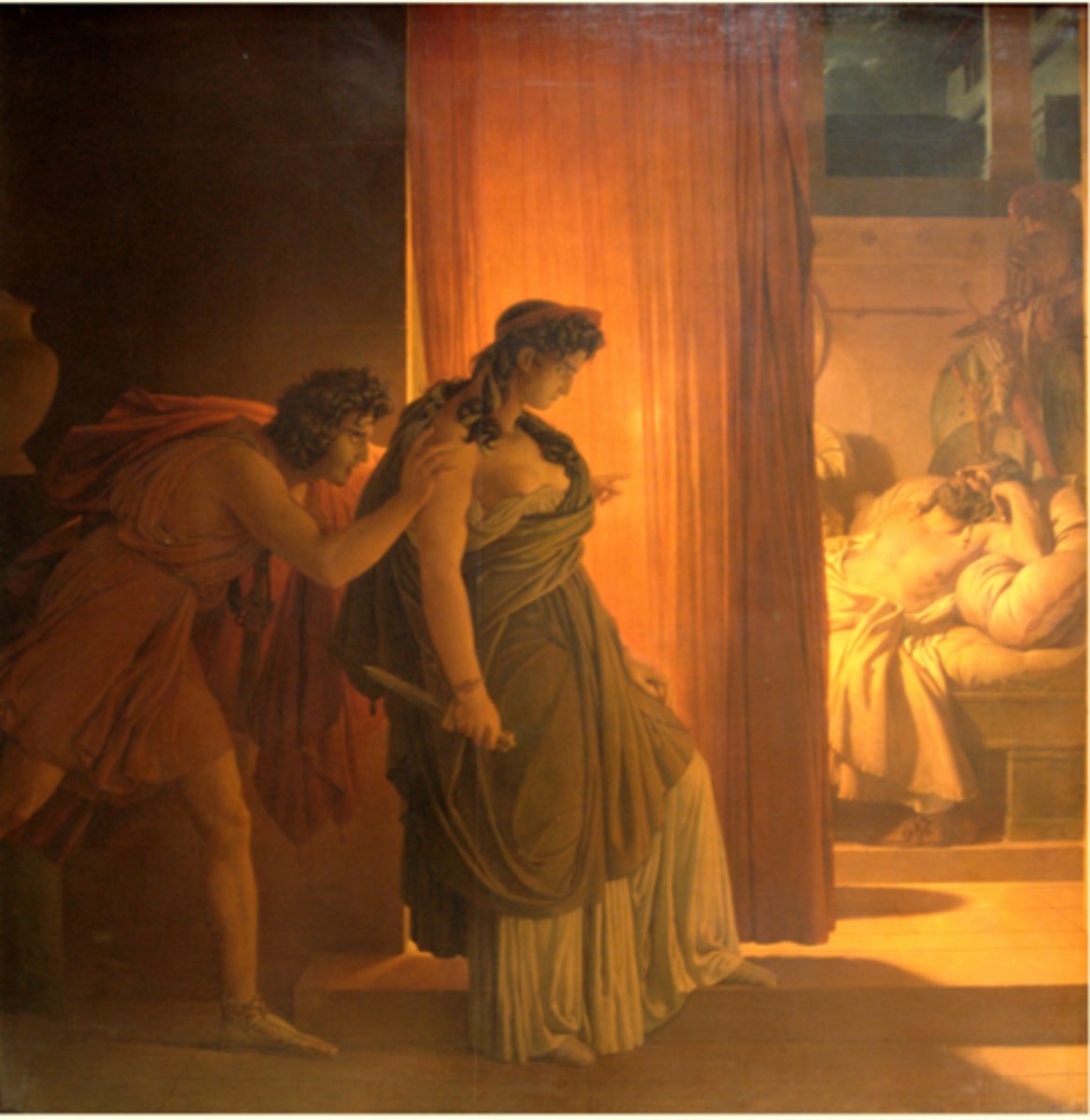
Crete
Location of the Minoan society (3000-1500 BCE). Large island in Aegean sea. Largest Greek island.
Croesus
Wealthy. Last king of Lydia. Clever militarily. Attacked Persian empire/Cyrus after misinterpreting oracle at Delphi. Defeated by Cyrus. Almost got burnt to death by Cyrus, but saved by Apollo. Became sort of pet advisor to Cyrus. Descendant of Gyges (in the 5th generation), destined to pay for the crime of his ancestor.
cultural history
bottom up, ideas and beliefs that that motivate people, in contrast to great man history, economic/war/social/etc. emphasis
Cyrus
"The Great," Persian King. Founder of Achaemenid dynasty and the Persian empire. His maternal grandfather was Astyages (brother-in-law of Croesus, King of Media). Son of Cambyses. Cyrus overthrew Astyages, seizing the Persian throne (Persians had been subjugated by the Medes). Cyrus had been raised by Cyno (" b") and her husband as a slave bc Astyages tried to have him killed (thinking he was meant to overthrow him). Cyrus is eventually discovered as the grandson of Astyages (story of Cyrus acting like a King on the playground). Conquered Lydia, Ionia, Assyria, Babylon, etc. Built a great empire, known for his conquests.
Darius
Darius I. proponent of monarchy in three types of government discussion, Persian King, expanded empire, invaded Greece (had it out for Athens in particular for reason?) Defeated at Marathon, 490 BCE. Helped overthrow Smerdis the Magus. Tricked other 6 'conspirators' to become King - underhanded, clever, manipulative. Son of Hystaspes (Achaemenid family, Persian Governor). Father of Xerxes.
Delphi
Holy city, site of the foremost Oracle of Apollo, consulted for prophecy.
democracy
The idea that the people control the government; system of government where citizens participate in decision making.
demos
The masses, the common people (not aristocrats).
Dionysus
God of theatre, partying, wine, fertility; sailors wanted to kidnap him but turned them into dolphins. Good looking, young, associated with grapes.
dithyramb
In honor of Dionysus, choruses of 50 men performed songs, told magnificent stories in big groups, proto-tragedy.
drama
theatrical performances, inc. tragedies and comedies. Happens at city dionysia. Polyphonous - not narrative from one person's perspective, but dif characters that all voice their own truth.
Electra
name means "unmarried one," character in the Oresteia, daughter of Agamemnon + Clytemnestra, helps Orestes avenge father's murder (how does she help?)
Ephialtes
Reformed Aeropagite council (reduce its power) and redistributed functions to the demos. Assassinated 462/1 BCE. Athenian politician. Populist who gets killed.
Erinyes
Furies, transformed into Eumenides in Oresteia. Their job is avenging those who have no one to avenge them.
Franchthi cave
place- geological history, where the earliest greeks were, upper paleolithic-neolithic era, 35k years using the cave, abandoned due to human organization change and international trade
funeral oration
to commemorate those who died in battle, Pericles had a famous one where he talks about what makes Athens the best/supreme (Thuc book II). Practice of giving an annual speech to Athens honoring those who had died in war to the city in the last year. Prominent Athenian gives the oration. At Keramikos (where they make ceramics, pottery district of Athens, right next to a large cemetery).
Golden Age
Concept referring to a period of great achievement and prosperity in Athens. The construction of the Parthenon
Advancements in drama, sculpture, and science
The rise of democracy in Athens
Attic vase painting. Other places like Asia were making advancements, but they were writing things down
Great man history
compared to cultural history, why is this class called Pericles and Athens? → singular people, men, who change the face of human history and are considered "great"
Gyges
Historical figure associated with ancient Lydia. GYGES & CANDAULES' WIFE: MORALITY AND HISTORY, killed by slave after he let wife see her naked
gymnos
Concept related to nakedness or being unclothed, often in the context of athletic competitions. meaning "naked" or "nude". Only adult male citizens were allowed to use the gymnasia. Athletes competed nude, a practice which was said to encourage aesthetic appreciation of the male body, and to be a tribute to the gods. Vase paintings
Harmodius
Historical figure known for his role in the overthrow of the tyrant Hipparchus. Harmodius and Aristogeiton were the biggest gay heroes of ancient Greece. Harmodius and Aristogeiton were a Greek-style male-male couple, who assassinated Hipparchus, brother of the Athenian tyrant Hippia
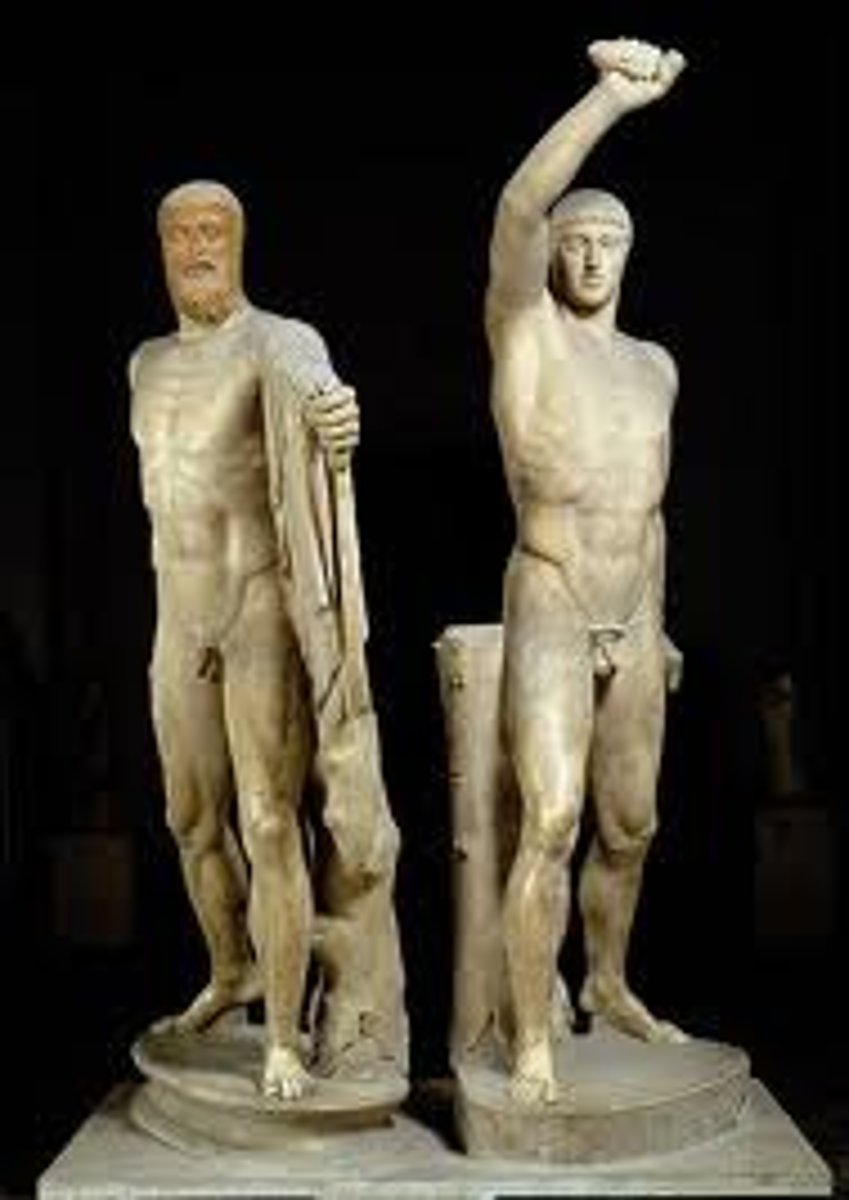
Hellespont
Place, the narrow strait between Europe and Asia, significant in ancient history. Xerxes had a pontoon bridge built towards Salamis. northwestern Turkey that forms part of the continental boundary between Asia and Europe and separates Asian Turkey from European Turkey.
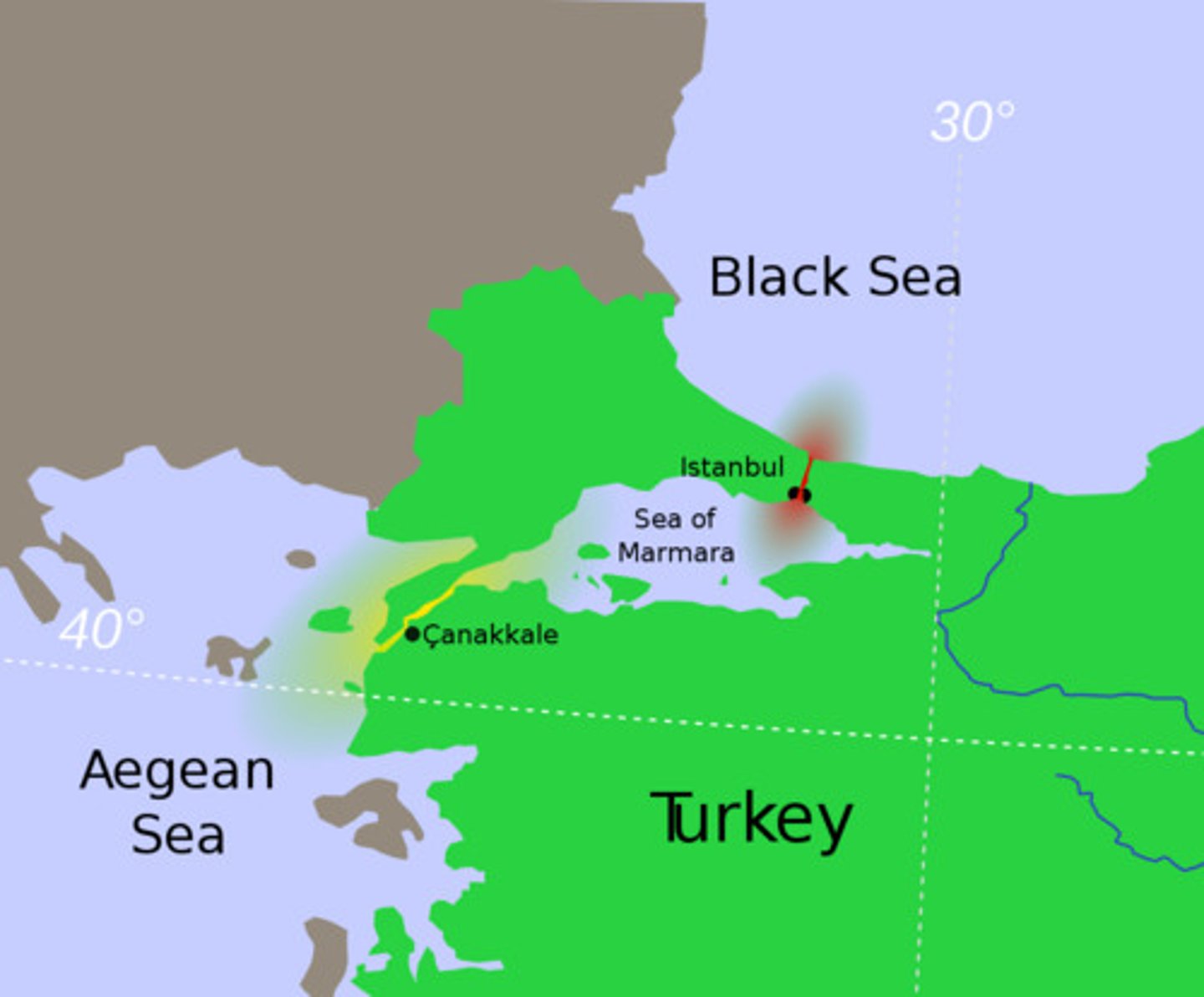
hero cult
has to do with chthonic? What is below ground has power? Where a hero's bones are deposited has special power, give honors and repetitive interest into the sight of someones burial, a big part of greek religion, bones have power and give them libations
Herodotus
father of history, wrote herodtus, divine and human causation, integration of oral history and professive/within, relativism, dramatization, source citation, and critical analysis, historia, traveled widely in youth and settled in athens, attracted by gov/wealth
Hipparchus
assassinated, autocratic ruler, death was the beginning of democratic athens, hipp=high social class. Son of Pisisturtus
Hippias
at battle of marathon with persians, wanted to betray greek city and serve as puppet king for persians, but greeks won the battle of marathon. Son of Pisisturtus
historia
Concept originated by Herodotus. "inquiry" or "investigation," signifying his approach to writing history as a process of actively researching and collecting information about past events, essentially establishing the concept of "history" as we understand it today; he is often considered the "father of history" because of this innovative metho
hoplite
A warrior spear stand close to each other in battle, have strong defense and offense, sending non cavalry soldiers in- base inventory was hoplite. General principle transferable. Round shield (3ft diameter), having spear, sword of certain type -- the aesthetic is very 5th century Greece (Athens, Sparta, all city-states). Persians don't have this (they have smaller shields, curved swords, lots of archers).
hybris
("LAWLESS OUTRAGE"). In Greek tragedy, hybris is an excess of ambition or pride that leads to the downfall of the character
hydria
A type of vase, HOLDS WATER
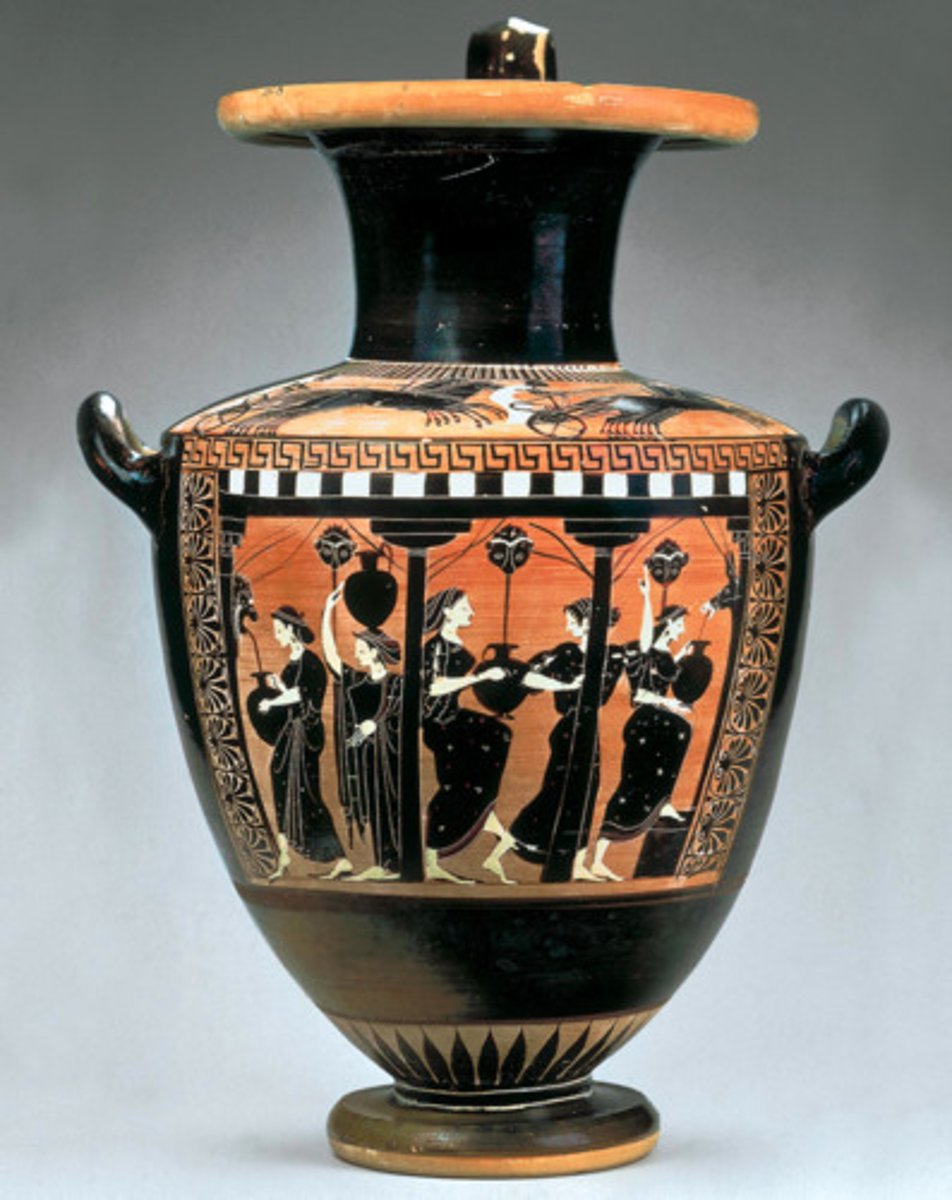
Mardonius
a Persian general who encouraged King Xerxes I to invade Greece. Herodotus describes Mardonius's attempts to convince King Xerxes to stay and fight after the Persian defeat at the Battle of Salamis.
Ionia ???
Artemisia, the Ionian Greek leader. Herodtus was Born ca. 485 BCE, in Halicarnassus, Ionian city. he Ionian Revolt (499–493 BCE) – The Catalyst for the Persian Wars
The Ionian Greeks, under Persian rule, rebelled against King Darius I with the support of Athens and Eretria.
Though the revolt was crushed, it provoked Persian retaliation, leading directly to Darius’ invasion of Greece and the start of the Greco-Persian Wars.
Cultural and Political Divide Between Greeks and Persians
Ionia was a borderland between East and West, where Greek city-states were influenced by Persian rule but still sought Greek-style autonomy.
Herodotus often contrasts Greek freedom (eleutheria) with Persian despotism, using Ionia as an example of Greeks resisting Persian dominance.
Herodotus’ Personal Connection
Herodotus was from Halicarnassus, a city with Ionian ties, which may have influenced his perspective.
He emphasizes Ionian resistance and suffering, portraying them as key players in the struggle against Persian expansion.
Persian Strategy and the Role of Ionia in the Wars
After the Persian defeat at Marathon (490 BCE), Xerxes I used Ionia as a staging ground for his massive invasion of Greece (480 BCE).
Many Ionian Greeks, under Persian rule, were forced to fight for Persia, creating internal divisions among Greeks.
kalos
A concept meaning beautiful/noble, often inscribed for athletically nude men. erotic fascination with young men hot and at the drinking party they fineeeeee
Keramikos
A place known for pottery production and ceramics, as well as a location for funeral oration.
krater
MIXING BOWL, used for diluting wine with water.
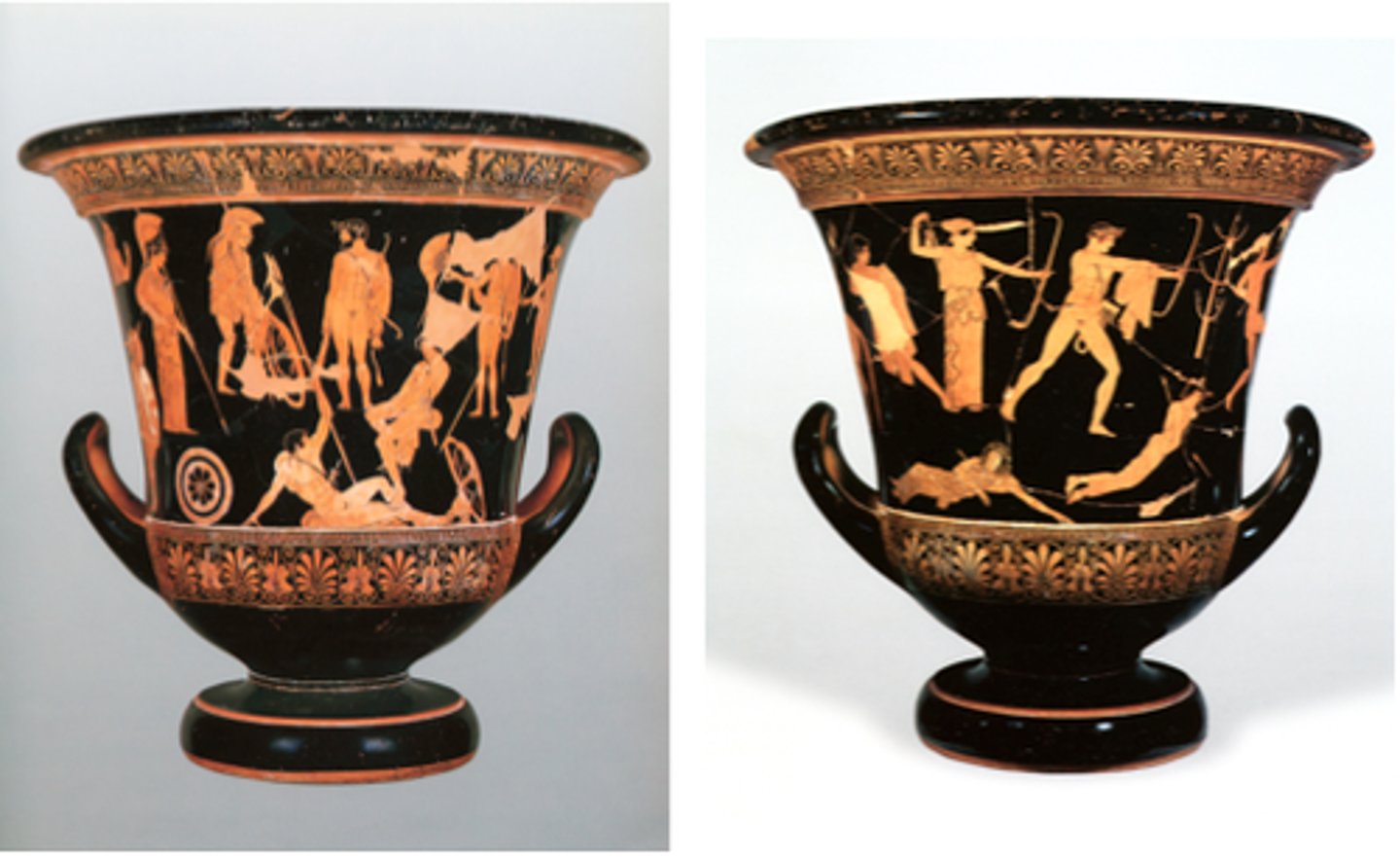
kylix
A party drinking vessel. eye-cup (drinking cup) with TONDO IN THE CENTER OF A KYLIX, paint interior and exterior
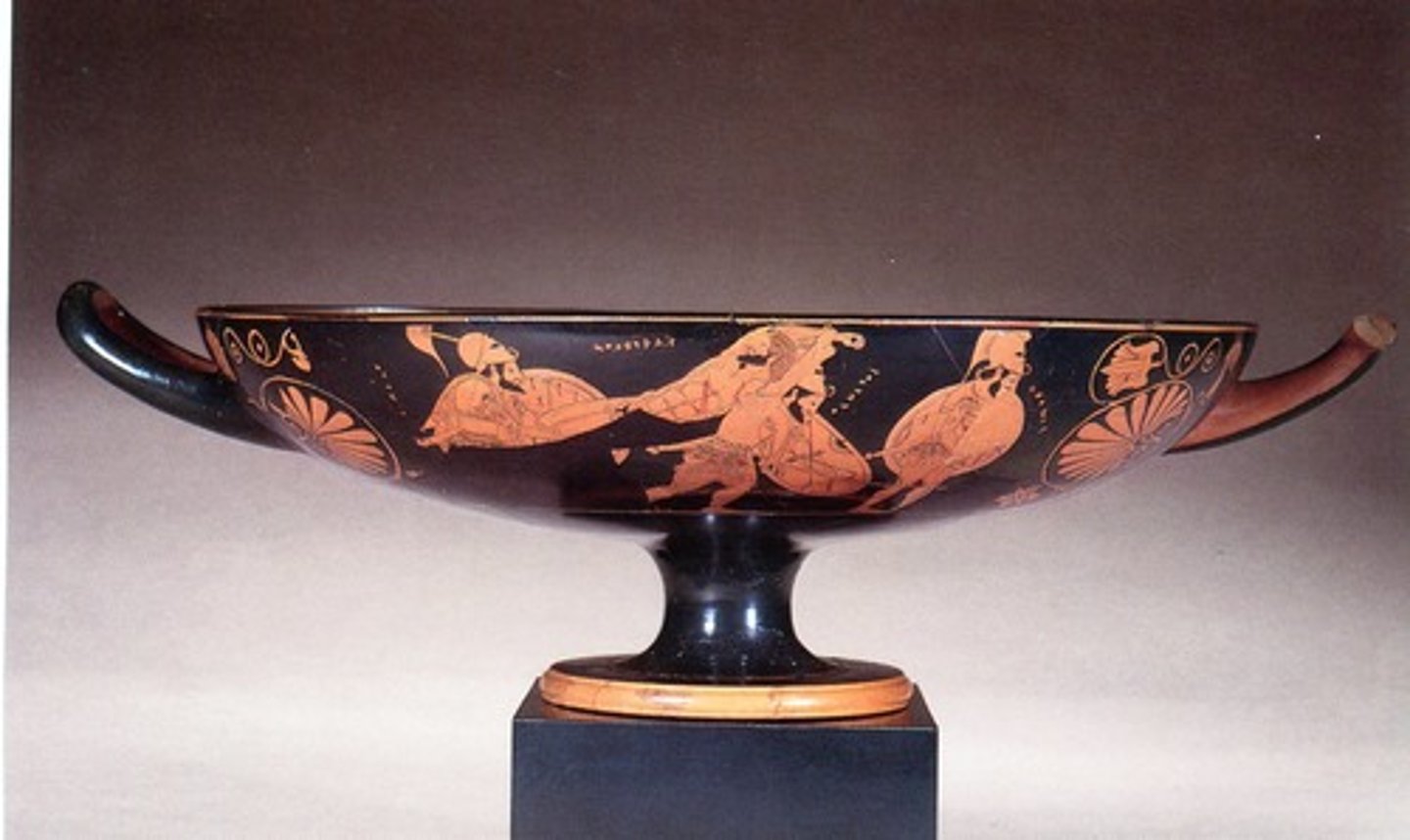
lekythos
An object used for storing oil.
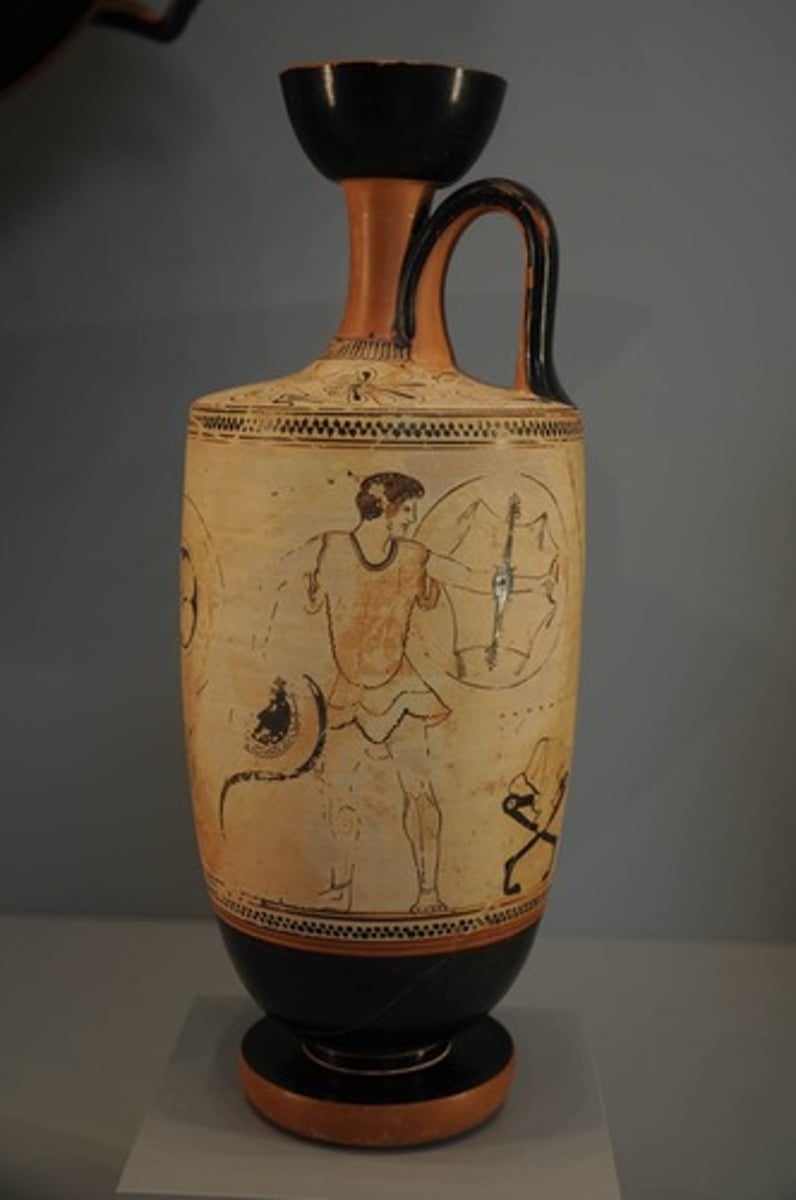
Marathon
BATTLE OF MARATHON The Battle of Marathon
The Athenians were outnumbered by the Persians, who had invaded Greece. The Athenians sent messengers to cities throughout Greece for help. The Athenians won the battle, which is considered a notable achievement in history. the messenger Pheidippides' run to Sparta for help.
Mycenae
A place that reflects proto-Greek culture and the Trojan War myth. Established bronze age. athens was a mycenaean era greek stronghold, fell apart due to mass migration, destruction, and depopulation into mesopotamia
Mythos
Aristotle used to describe plot of tragedy, an Athenian tragedy's plot as a "representation of an action" or "the arrangement of the incidents" that "represents the action" was a term for a story, narrative, or speech. It was used to describe a complex tapestry of historical events and divine influence that provided meaning to the world
Nomos
A concept encompassing religion, law, and custom. Aristotle used nomos in his analysis of the relationship between nature and law
olbios
generally applied, happy/blessed = transferred/metaphorical meaning, 2.) happy, blessed eso with reference to worldly goods, good fortune
oligarchy
ruled by the few, (sparta)
Oracle
An institution providing prophetic insights. consult the oracle, delphi is the prominent one, act in battle because of messages, speaks in riddles
orchestra
A place associated with performance, particularly in theater. Space defined by 1) small temple, 2) an alter, 3) a sacred grove, and 4) an orchestra (diameter 85 feet) supported by a retaining wall. a semi-circular space for dancing and performing that was central to the drama. The word "orchestra" comes from the Greek word, means "dancing place"
Oresteia
A work of dramatic literature by Aeschylus. THE FURIES/EUMENIDES (AND ORESTEIA, AS A WHOLE) DRAMATIZES A TELEOLOGICAL PROCESSION OF JUSTICE, FROM RETRIBUTIVE TO DISTRIBUTIVE, FROM FAMILIAL TO COMMUNAL
Orestes
MOUNTAIN MAN, Libation bearers, Orestes's quest to avenge the murder of his father Agamemnon by his mother Clytamnestra.
ostracism
ostraka process, anti-popularity, who they wanted to vote out to prevent tyranny, used discarded pot shards to vote
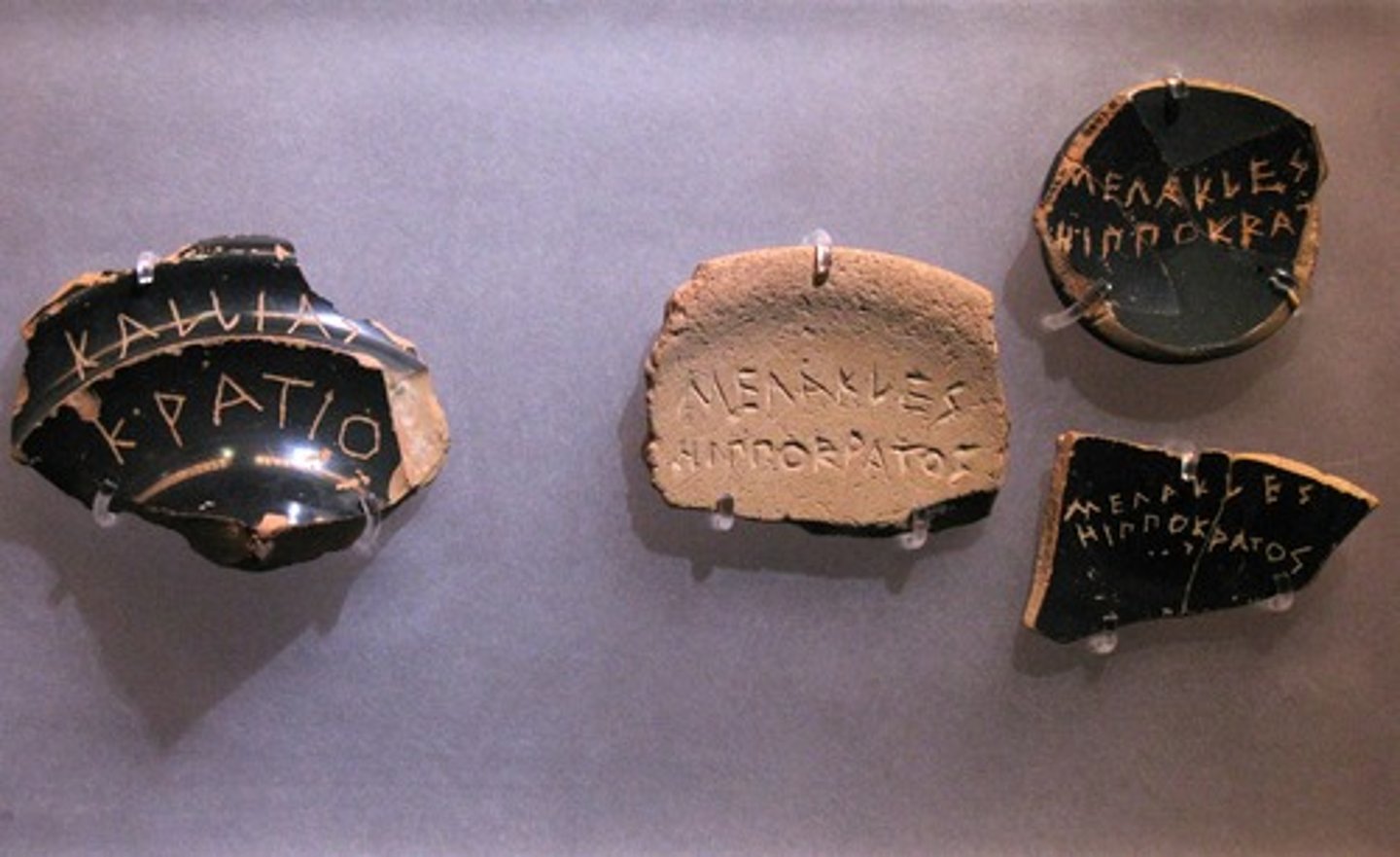
Panathenaia Festival
An institution celebrating the patron goddess Athena. It was held annually in the summer and included athletic competitions, music and poetry contests, and religious ceremonies. Herodotus is said to have recited his history to the Athenians at the Panathenaea
Peisistratus
A tyrant of Athens known for his two sons. Instituted the Panathenaic Festival, a midsummer festival that included sports and a procession. Instituted the City Dionysia, the first known drama competitions. new public buildings, such as a 'fountain house' to improve the city's water supply, sons: Hippias and Hipparchus
peripeteia
A concept referring to a sudden reversal of fortune. Aristotle, in his Poetics, defines peripeteia as "a change by which the action veers round to its opposite, subject always to our rule of probability or necessity. it can bring forth or result in terror, external changes
Persians
A group often depicted with patterned pants on vases, known for their democratic influence on Ionian states because believe democracies are weak
Phye
woman that was dressed up as athena by Peisistratus and led the parade into town, thought athena must support Peisistratus and made him tyrant, she was really tall and pretty, dressed as the goddess Athena in order to deceive the people of Athens into believing that Peisistratos' return to Athens was divinely sanctioned. ppl would have reocongized/known it was her
polis
An institution representing a city-state or political entity. take single city, group of people, or political entity etc. Independent & Self-Sufficient → Although poleis (plural) shared Greek culture, they operated autonomously, with their own laws, military, and economies.
Public Spaces → The agora (marketplace and political center) and the acropolis (high city, often with temples like the Parthenon in Athens) were key locations.
red figure
vases with black background of slip and figures that are the same color of red clay
Salamis
place of naval battle 48-bce, rebuffs persian naval advance, right outside of Athens, Themistocles, listen to announcement to trust in wooden walls, one of 2 major battles
satyr
half-man, half-beast creatures who were often depicted as having goat legs and horns. They were companions of Dionysus
Solon
A historical figure known for his reforms in Athens. Solon balanced aristocratic and democratic elements. Abolished debt slavery (Seisachtheia).
Reorganized the political system based on wealth rather than birth.
Established new legal codes, making the justice system more accessible.
Encouraged economic reforms to boost trade and prevent economic crises.
Stasis
civil discord, civil strife, factionalism, class warfare, tipping point, take polis when they are at odds and what puts them at odds
symposium
drinking party, networking/social trading, pederasty (boy love), only citizen elite men, occurred in the andron, sexual economy, enslaved cup bearer, flute player
theater (institution)
theater
Invention of drama: thespis, pisistratus, and theater as organ of democracy
Themistocles
A popular figure voted out in ostracism/ostraka (voted on old pot pieces someone to vote out to prevent tyranny). accusations of treasonable correspondence with Persia. To escape prosecution, he fled to Asia Minor and eventually sought refuge at the Persian court, where he was appointed governor of some Asian Greek cities under Persian control.
Thermopylae
spartans last stand, moral/lesson = better to fight and die for freedom than live in slavery, glory/commemorative, 2 prophecies = athenians decided to not bend to the will of the gods but original oracle said they would all die, second oracle emphasized importance of wooden wall (walls of ship) fight with naval
Thespis
The founder of tragedy, maybe mythical, did someone to his face to make him stand out, first to make roles out of chorus
Thucydides
A historical figure and historian. Wrote the History of the Peloponnesian War.
tondo
A decorative circular image in the center of a kylix.
tragedy
archetypal democratic artwork, a dramatic form of storytelling that explores human flaws and the consequences of fate 3. Principles of tragedy- fatal flaw, uh oh moment, reversal of fortune
trireme
A type of ship used in ancient naval fleets. Thyc: trireme as a warship developed by the Corinthians and used by the Athenian navy. The trireme was a fast, maneuverable ship with three banks of rowers on each side
tyrant
sole ruler, greek tyranny was non-hereditary sovereignty, often practically integrated with oligarchy, sometimes with popular approval, not necessarily a bad word
Xerxes
court culture = lots of support from massive land and sea incursion, persian, top ruler of men presented alongside gods, built canal and pontoon bridge (massive infrastructure processes to increase economic success)
Herakles
sons of sea people in late bronze age. Parents: Son of Zeus and Alcmene (a mortal woman).
Hera’s Wrath: Because he was Zeus’ illegitimate child, Hera hated Herakles and made his life difficult from birth, even sending snakes to kill him as an infant—but he strangled them with his bare hands.He was seen as a protector of athletes, and the Olympic Games honored his strength.
Herakles as a Pan-Hellenic Figure → Both Athens and Sparta claimed him as an ancestral hero.
Eumenides
The Furies, deities of vengeance, who pursued wrongdoers and were associated with the cycle of retribution in Greek mythology. The Eumenides are central figures in Aeschylus's "Oresteia," representing the transition from personal vengeance to a system of justice.
europa
Cretan traders from Phoenicia (modern Lebanon) and brought to Crete, making her an early example of East-West interactions.
He presents this as a historical event rather than a divine myth, aligning with his tendency to question and rationalize myths.
Role in the East vs. West Narrative:
Europa’s "abduction" is linked to a cycle of retaliatory kidnappings between Greeks and Eastern peoples:
Phoenicians abduct Europa → Greeks (led by Jason) abduct Medea → Paris abducts Helen → Trojan War ensues.
exchanging of women to explain migration and euope